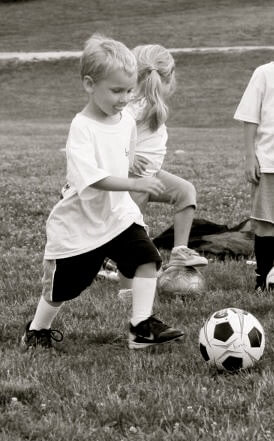
HKI is excited to introduce Christina Estrada as our guest blogger. Christina shares a similar passion for kids health and is incredibly knowledgeable about youth fitness. From toddler to high school athlete, she breaks down what to eat, how much to eat, and when to eat it for optimum energy and performance.
Sports and play activities aren’t just great ways to occupy your time and add enrichment to your child’s daily routine. Studies have shown that sports can help to boost a child’s self-confidence, build character, promote health (all the way into adulthood), encourage team work, and enhance the physical and emotional development of your child. Depending upon your child’s age, there are all kinds of wonderful things happening to their body while they play.
Have you ever watched a bunch of three and four year old children playing soccer? You know what I’m talking about…the huge flock of children all trying to get the ball, none of them concerned about where the goal is or who they’re trying to steal the ball from. Well, even though it makes some parents giggle and other (more competitive) parent’s cringe, it’s really good for their young little bodies to be able to explore the space around them, to feel their feet running, kicking, and tripping! All these seemingly  disorganized actions are helping to develop your child’s gross motor skills.
disorganized actions are helping to develop your child’s gross motor skills.
Introducing kids to endurance sports is critical for preventing the risk of heart disease and diabetes. Kids between four and ten years old increase their cardiovascular capacity and muscular endurance when they engage in sports that require whole body movements, like swim, tennis, or lacrosse. Not only that, but new research is looking into the connection between practiced sports skills and the prevention of Alzheimer’s disease later in life.
All of these activities are building bones, strengthening your child’s lungs, repairing and building strong muscles, increasing blood volume, establishing nerve connections, and burning calories! Even when kids are just goofing around on the playground, they are preparing their bodies for more specialized training in later years.
Every young person needs quality nutrition to grow. But the young athlete who is growing and training and performing needs quality nutrition - in a greater amount - and at certain times. If both you and your athlete take the time to learn these simple concepts now, you’ll both be ready for a lifetime of good health and vitality.
WHAT should you feed your athlete?
There are six types of nutrients necessary for good health and optimum performance. These include fats, carbohydrates, proteins, vitamins, minerals, and water. The body creates energy from fats and carbohydrates, it builds and rebuilds cells with proteins, and it regulates all those processes with the vitamins, minerals and water you consume.
HOW MUCH should your young athlete eat?
In order to ensure that your child gets adequate nutrition, you should strive to feed them at least five meals each day. A good way to keep track of portion sizes is the “rule of palm.”
- 1 – 2 palm-sized portions of protein
- 1 – 2 fist-sized portions of veggies
- 1 – 2 cupped handfuls of whole grains or fruit
- 1 – 2 thumb-sized bits of healthy fats
- Low calorie beverage - NOT DIET SODA
A vitamin or mineral supplement is not necessary as long as you make sure to include a colorful assortment of vegetables and fruits into their diet.
WHEN is the best time to eat?
Nutrient timing can become a very complex process when your child gets into collegiate or professional sports, but at an amateur level there are really just four things to remember:
- Carbohydrates are the high performance fuel. Eat one or two servings of fruit or some vegetables or whole grains about an hour before a sports event to give your athlete increased energy to start off strong.
- Fats are the most energy rich food source. Consuming a serving of fat about an hour before a sports event will give your athlete a long-lasting source of energy.
- Proteins are the body’s most important structural material – they are the building blocks of our cells. Have a serving of protein about an hour before any sports-related event and then again about 30 minutes to an hour afterward to promote recovery.
- Water makes up sixty percent of the body. It is vitally important for controlling metabolism, digesting food, delivering nutrition to the cells, cellular communication, and temperature regulation. The easiest way to check hydration is to ensure that the urine is clear or very pale yellow. Then, after each practice or game, make sure to replenish lost fluids before engaging in another vigorous activity.
Encourage your athlete to find out how protein turns into muscle and how carbohydrates give the body energy. Teach them how to eat healthy and why it’s important. You’ll set them up for success in sports and life!
Leave a comment below with one of your kids favorite pregame meals.
Christina Estrada holds her AS degree in Exercise Science with specialties in Youth Fitness, Fitness Nutrition, Strength and Conditioning, Senior Fitness, and Exercise Therapy. Her lofty goals include bettering the lives of 1 million families by 2018 by improving their financial, physical, and emotional wellness. She lives in Atlanta, Georgia with her husband, Tony, and their three young sons. To connect with Christina and find out more about youth fitness or family wellness, please like her company Facebook page by searching for Hopscotch Family Company.
